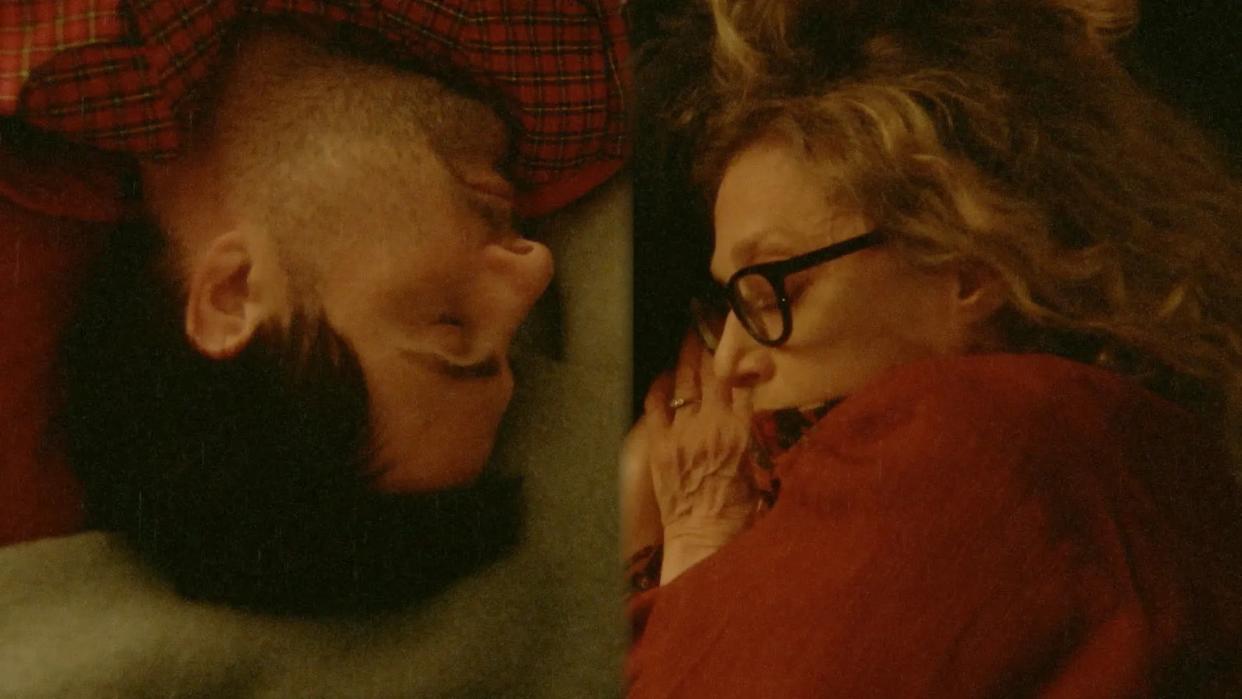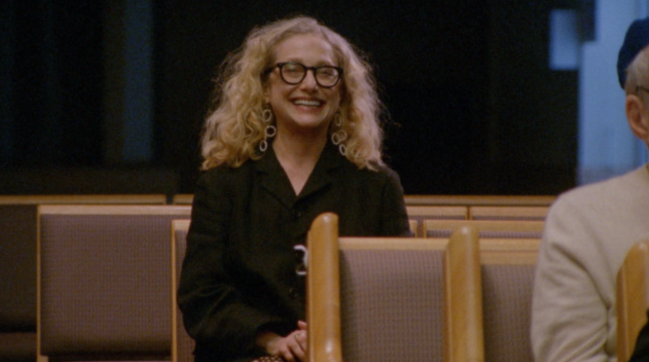‘Between the Temples’ Review: Jason Schwartzman Plays a Grieving Cantor in Wry, Hilarious, and Very Jewish Screwball Comedy About Life After Death


My favorite thing about being Jewish — and it’s just so hard to pick between classic hits like “unleavened bread,” “having shoulder hair at 15,” and “being used by right-wing nationalists as an excuse to justify the same kind of genocide that tends to be inflicted upon us every other century or so” — is that I’ve always felt like the religion and its attendant culture places an unusual emphasis on being alive. Six thousand years of trying not to die can do that to you. We don’t believe in heaven, and we don’t believe in hell; when someone passes, we say “may their memory be a blessing,” and when we pray on Yom Kippur (one of the few days of the year that most of us go to shul), we only ask God to write our names in the Book of Life so that we can spend another trip around the sun complaining about how much everything sucks on Earth. The fact that you’re able to keep complaining about how much everything sucks is how you know you’re alive in the first place.
Of course, the idea that this might be all we ever get can make it that much harder to appreciate our time here. There is a lot of joy in the Jewish tradition (most of which stems from the shared recognition that it’s somehow managed to survive), but happiness… well, I’ve always been slightly relieved by the notion that happiness might be for other people. God didn’t choose us for that. If we had happiness, it wouldn’t be happiness.
More from IndieWire
In lieu of that, we’ve evolved to embrace the connective powers of misery. Overbearing mothers bond with their large adult sons through several millennia of inherited tsuris. Albert Brooks unites an entire diaspora by defending the disappointment of our lives. These are beautiful things. At the same time, however, we can’t help but want all the bliss in the world for our loved ones, and sometimes I fear we might lose our ability to understand them if they actually managed to find it.
No film this side of “A Serious Man” has confronted that specific fear as directly as Nathan Silver’s “Between the Temples,” a spiky, hilarious, and thoroughly unorthodox screwball comedy about a grief-stricken cantor who loses his voice, only to find that he’s surrounded by a chorus of well-intentioned people who are happy to speak for him. Played by a note-perfect Jason Schwartzman (the “Asteroid City” star delivering another fumblingly wistful performance as a widower trying to make sense of his pain, this one inspired by the music of David Berman), Ben Gottlieb has never been sadder than he is at the start of this story. Needless to say, he’s also never been closer to his moms.
In fact, he moved back in with Meira (Caroline Aaron) and Judith (“Triangle of Sadness” breakout Dolly DeLeon) sometime after his late wife Ruth cracked her head open on an icy sidewalk, fleeing from the house he shared with her in the same one-waiter New York town where he was born. Ben’s moms are already hard at work at helping their son move on by the time the film begins, as we glean from the frenzied prologue where they suggest he see a doctor — and by “see a doctor” Meira and Judith naturally mean that he should go on a date with the overeager plastic surgeon they’ve already got waiting for him in the hallway (she’s played by a scene-stealing Annie Hamilton, whose straight-faced intensity sets the tone for a movie that constantly trots out the oldest Jewish jokes and stereotypes only to warp them beyond recognition).

The set-up doesn’t work out, mostly because Ben’s vibe at the moment is less “I want to meet someone new” than it is “I want to lie down in front of a slow-moving truck and shout ‘keep going!’” He can’t fathom a future without his dirty-talking alcoholic novelist of a wife, and feels convinced that everything worth living for is already well behind him. “Even my name is in the past tense,” Ben deadpans at one point, that tossed-off line typical of Silver and Chris Mason Wells’ script, in which every line feels like a cosmic joke being delivered by its own punchline.
Anyway, Ben gets wasted on mudslides at the local bar, provokes a fight with a local played by editor John Magary (whose jagged cuts evoke the same air of comic violence that previously defined “The Mend”), and altogether does everything in his power to make himself a subject worthy of Sean Price Williams’ unsettled 16mm camerawork. Through it all, Schwartzman’s eternally childlike punim emphasizes the self-infantilizing nature of Ben’s very adult grief, which his moms only think they want to encourage.
What they fail to anticipate is that Ben will soon have a chance encounter with his grade school music teacher (Carol Kane, dayenu!), now 70 years old and mourning the loss of her own partner. Carla doesn’t remember Ben, but it won’t be long before she helps him remember himself. The daughter of anti-religious Communist Jews and the widow of an aggressively devout atheist, Carla sees Ben as a chance to fulfill her lifelong dream of having a bat mitzvah. In return, she’ll give him something to sing about. “I taught you,” she tells him, “now you teach me.” It’s a match made in upstate New York. He’s a cantor, she’s an Aquarius — could I make it any more obvious?
As these two lonely souls develop an unusual friendship based on lightness, mutual understanding, and mushroom-laced tea, they’re both confronted by the expectations of those around them. Carla’s son (“Mistress America” actor Matthew Shear) assumes that his mom is just going to keep a low profile until she’s ready to shuffle off this mortal coil, and he’s surprised — even angry — to discover that she still wants things for herself. Ben’s moms, on the other hand, are so eager for their son’s inevitable second marriage to another nice Jewish girl that they take it upon themselves to create Ben’s new JDate profile (a decision that paves the way for a laugh-out-loud cameo by Pauline Chalamet).
That meddling inevitably coalesces around the local rabbi’s wayward daughter, a semi-demented actress who’s a bit too desperate for a part to play (Madeline Weinstein’s immaculately self-possessed performance might be the most winsome and recognizable portrayal of a twentysomething Jewish girl since Alana Haim in “Licorice Pizza”). Gabby is beautiful and broken in all the ways that should appeal to a guy like Ben, and it probably doesn’t hurt that her dad is an understated Robert Smigel, but it’s hard to say if Ben will be able to stomach the vertigo of dating someone who’s so reminiscent of his dead wife.
Things definitely threaten to get a bit dizzying as Ben and Carla begin to bring each other back to life; the intensity of the bond they forge over their private bat mitzvah lessons proves confusing to everyone around them, a disconnect that culminates in a catastrophic Shabbat dinner so painful it could almost pass for real life. It’s a great scene in a movie full of them.
It’s also a marathon in a movie that otherwise tends to feel like a 100 discrete sprints, each of them full of killer details and non-kosher gags, and it turns on a revelation that — despite hiding in plain sight from the start — nevertheless hasn’t been given enough of a chance to earn the momentum it needs to stick the landing. It builds to an ending that feels true to the film’s characters (while also inviting us to shoulder some of the blame for not seeing it sooner), but I found myself wishing that Silver had done a bit more to show his work.
All the same, it’s not as if it’s some great mystery why Ben and Carla are drawn to each other, and Kane’s non-judgmental warmth sells Carla as a clear panacea for a grieving man who just wants to feel the unconditional love of being a kid again. He probably won’t feel that way forever (the mirror his moms have hung next to a painting of Ben as a child won’t always look like such a damning portrait by comparison), but he’s not there yet, and Carla’s the only one who seems OK with that. She connects with Ben in the same way she connected with the Jewish music her parents wouldn’t let her learn about when Carla was a kid: She doesn’t really understand the words he’s saying, but she loves the way they sound.
“Between the Temples” — its punny title pointing towards the kind of latitude that Ben and Carla are begging for in order to find their bliss — ultimately isn’t sure if happiness is viable in the long-term. But in focusing less on the happiness we imagine for other people than on the happiness we get to share with them instead, it finds enough fleeting joy to make being alive feel like its own eternal reward.
Grade: B+
“Between the Temples” premiered at the 2024 Sundance Film Festival. It is currently seeking U.S. distribution.
Best of IndieWire
Sign up for Indiewire's Newsletter. For the latest news, follow us on Facebook, Twitter, and Instagram.

 Yahoo News
Yahoo News 
